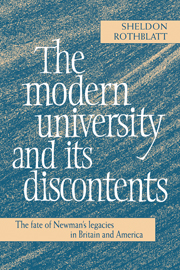Book contents
- Frontmatter
- Contents
- Preface
- 1 The idea of the idea of a university and its antithesis
- 2 ‘Consult the Genius of the Place’
- 3 ‘The first undergraduates, recognizable as such’
- 4 Failure
- 5 Historical and comparative remarks on the ‘federal principle’ in higher education
- Interlude: General introduction to Chapters six and seven
- 6 Supply and demand in the writing of university history since about 1790: 1. ‘The awkward interval’
- 7 Supply and demand in the writing of university history since about 1790: 2. The market and the University of London
- 8 Alternatives: 1. The importance of being unattached
- 9 Alternatives: 2. Born to have no rest
- Index
3 - ‘The first undergraduates, recognizable as such’
Published online by Cambridge University Press: 02 December 2009
- Frontmatter
- Contents
- Preface
- 1 The idea of the idea of a university and its antithesis
- 2 ‘Consult the Genius of the Place’
- 3 ‘The first undergraduates, recognizable as such’
- 4 Failure
- 5 Historical and comparative remarks on the ‘federal principle’ in higher education
- Interlude: General introduction to Chapters six and seven
- 6 Supply and demand in the writing of university history since about 1790: 1. ‘The awkward interval’
- 7 Supply and demand in the writing of university history since about 1790: 2. The market and the University of London
- 8 Alternatives: 1. The importance of being unattached
- 9 Alternatives: 2. Born to have no rest
- Index
Summary
PROLOGUE
G. M. Young remarks in a footnote in passing, that the poet P. B. Shelley and his friend and biographer, T. J. Hogg, ‘seem to me the first undergraduates, recognizable as such, on record’. We cannot know exactly what he meant, but we can surmise from Hogg's Life of Shelley and the facts of Shelley's residence at Oxford that he spotted in the circumstances of the poet's rebellion and expulsion a set of attitudes towards a university experience that approximated a style of response more typical afterwards. He could not have meant that subsequently all undergraduates would recapitulate the direct experiences of the two friends. But he probably meant that in and around Shelley, just before and after, a university education became a more significant, even a defining experience in the lives of those whose institutional connections earlier were more tenuous, less problematical or emotional and who were not so personally identified with the institutions, the routines and the history of the universities. They hardly shared in its ‘idea’ or experienced its ‘place’.
We can therefore attempt to fill in the spaces that Young provides us by examining the emergence of a student estate and condition in which the university became a stage in the life cycle of the undergraduate, a necessary step on the path to adulthood and maturity. We can also notice the gradual appearance of a literature that purported to explore the meaning of that estate in story and novel.
- Type
- Chapter
- Information
- The Modern University and its DiscontentsThe Fate of Newman's Legacies in Britain and America, pp. 106 - 178Publisher: Cambridge University PressPrint publication year: 1997



